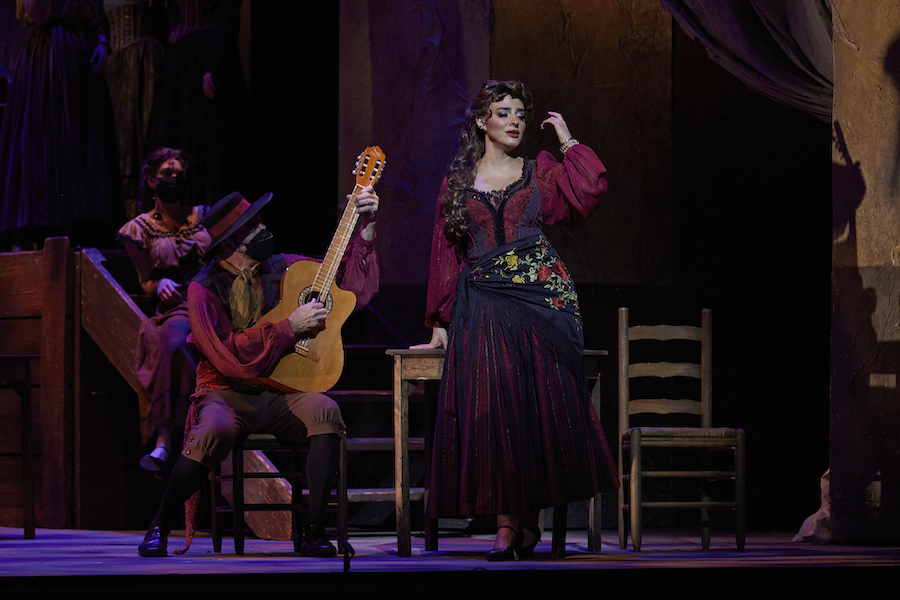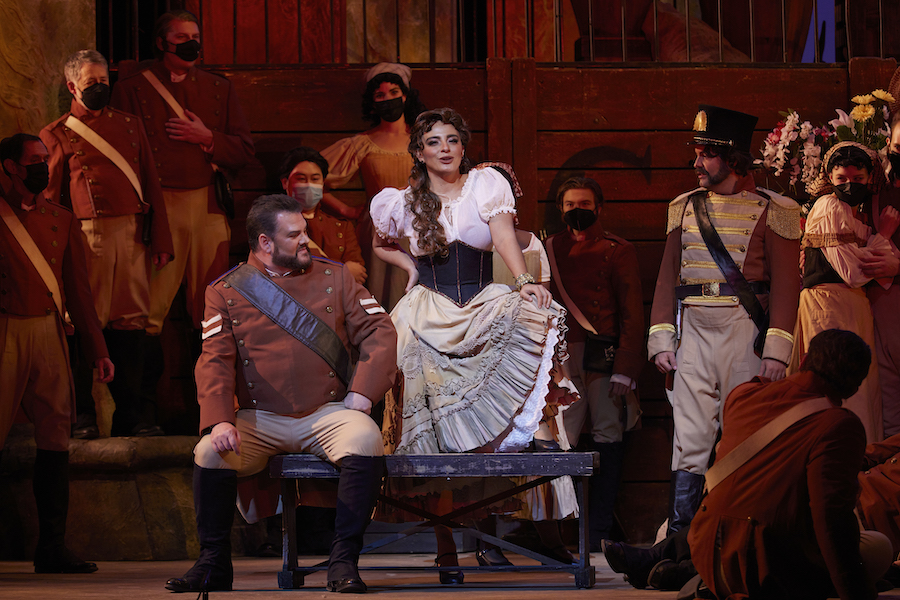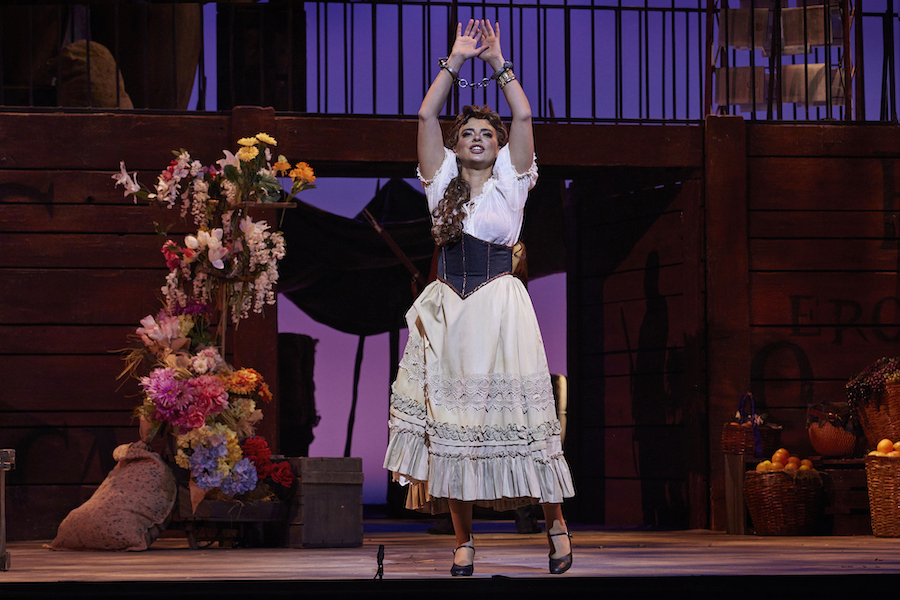To open its 50th anniversary season, Calgary Opera is presenting Bizet’s Carmen. The idea to do this opera for the anniversary came from former Artistic Director Bramwell Tovey, a much-appreciated figure on the Calgary musical scene who recently died from cancer. The production, a very fine one, is dedicated to his memory.
It is the strength of this production that it avoids underlining any specific social preaching and lets the inherent moral ambiguity of the original work to be emerge, forcing the listener to come to his/her own personal understanding of the meaning of the drama. This restraint in the telling of the story is one on the best things about the production.
In the production, considerable effort has been expended upon the integration of the dramatic and musical elements, evident from the seamless relationship between the chorus and principals in the action. Throughout the opera, the chorus is fully woven into the storytelling, sometimes part of the juste milieu, and other times, such as the final scene, forming a component of the background. One can only be impressed by the thought and care given to this aspect of the production.
The chorus, prepared by Chorus Master and Artist-in-Residence Mark Morash, sang cleanly and clearly, even in contexts where there was much to do on stage. Only a mature chorus can really do this, and the Calgary Opera Chorus now shows the benefits of its long experience on stages, as well as the benefits of expert stage direction.
Overall, the production was a triumph for Stage Director Brenna Corner and her team, a point strongly acknowledged at the final curtain with the production team receiving prolonged and sustained applause from the capacity audience.

Rihab Chaieb (Carmen) with Allen Crowley (Guitar) © Harderlee Photography
The use of the original version of the opera, with dialogue rather than sung recitatives, gave the production an objective quality in the way the story unfolds, one less freighted with romantic pathos. The big scenes in the opera individually all had the character and point needed to be effective: the languid, seemingly inconsequential opening, where the story emerges as out of nothing; the crucial scene in the second act where Don José’s life is changed forever; and the final, dramatic ending of the opera, where Don José kills Carmen. My favourite act, however, was the smuggler’s act, often spotty in other productions. Here, every detail worked, and was capped with a stunning account of Micäela’s aria by Tracy Cantin.
The orchestra was also conducted by Mark Morash, who led a crisp, energized account of the score. Overall, the tempos, from the prelude to Carmen’s opening songs, to the famous quintet were all quick—perhaps just a bit quicker than is my personal preference. But this lightness and speed is part of the manner of the original operetta-style version of the opera as presented here. The Calgary Philharmonic Orchestra seemed to enjoy itself, with eloquent woodwind solos everywhere (notably the clarinet), and including a very graceful, pure account of the delicious flute solo in the entr’acte to Act 3.
Overall, the singing was of a superior quality, especially the singing of Rihab Chaieb, the production’s Carmen. Chaieb is perfect for the role; gracious in her movements, beautiful, and one of those people to whom all eyes seem naturally to turn—in short, just the Carmen that Bizet created. Chaieb is also blessed with the perfect voice for the part—well-carrying without being coarse, and with an effective top and bottom register.
Her opening act folk-like songs hit the mark, but there were even better moments later on. These included the important scene in the second act where she effects Don José’s capitulation to the world of the smugglers, and also the final scene, one of the best moments in the production. In all of these scenes, one sensed a woman of forceful personality but in no way a femme fatale as caricature—too often the way this role is played. This was a nuanced performance, strong where the character is strong, but also at moments vulnerable as well. And in the her singing, Chaieb delivered everything the role needs, from folk-like singing, to gypsy intonations, to vocalism of the highest pathos.
David Pomeroy as Don José provided a strong contrast to Carmen, his transformance from bemused soldier to desperate, out-of-mind lover was effectively made across the four acts. Vocally, he has a bigger voice for the part than is sometimes the case, the benefit of which came largely toward the end as the vocal demands increase. Despite the size of his voice, he managed the famous Flower Song remarkably well, a difficult aria to sing. In general, however, he sang louder than he needed to, sometimes to the loss of some beauty of tone.
As mentioned, Tracy Cantin was a marvelous Micaëla, especially in vocal terms, her voice is clear and strong, but also beautiful, and she has a terrific top register. The first-act duet, one of the best things in the score, was effective in every way, making one wonder why on earth Don José would choose Carmen over her.

David Pomeroy, Rihab Chaieb and Dominic Veilleux © Harderlee Photography
Just why Carmen would choose the toreador over Don José, however, was not hard to see. In a Hollywood-like star turn, Nmon Ford, the production toreador Escamillo, was every woman’s heart throb. Brimming with confidence, but also aware of his magnetism to the ladies, Ford fully inhabited the role, the point of focus whenever on stage. And he sang well too, if not naturally blessed with a sonorous low register.
Many of the smaller roles were taken by members of the McPhee Artist Development Program. This included to the smuggler ladies Frasquita (Nicole Leung) and Mercédès (Justine Ledoux), as well as the dragoon Moralès (Branden Olsen) and the smugglers Dancaire (Connor Hoppenbrouwers) and Remendado (Tayte Mitchell). All provided solid accounts of their roles, with an especially well-sung version of the famous quintet, which received a strong applause. The secondary roles were rounded out by Dominic Veilleux as Zuniga, the hapless officer who makes a pass at Carmen.
The sets from the Atlanta Opera and costumes from the Sarasota Opera worked well and evoked the requisite 19th-century atmosphere one expects of romantic Spain in operatic clothing. This is an exceptionally fine production of this great opera, one that caps Calgary Opera’s first 50 years and promises further accomplishments as the company heads into its next chapter.
Related content ⬇
Opera Canada depends on the generous contributions of its supporters to bring readers outstanding, in-depth coverage of opera in Canada and beyond. Please consider subscribing or donating today.
CALGARY OPERA
NOVEMBER 19, 23, 25, 2022
BIZETCARMEN
CAST AND CREATIVE TEAMS
Carmen Rihab Chaieb
Don José David Pomeory
Escamillo Nmon Ford
Micaëla Tracy Cantin
Szuniga Dominic Veilleux
Moralès Branden Olsen
Frasquita Nicole Leung
Mercédès Justine Ledoux
Dancaïre Connor Hoppenbrouwers
Remendado Tayte Mitchell
Conductor Mark Morash
Calgary Philharmonic Orchestra
Stage Director Brenna Corner
Fight Director John Knight
Chorus Master Mark Morash
Chorus Accompanist Ron Bennie
Head Coach and Associate Chorus Master Emily Hamper
Repetiteur Evan Mounce
Children’s Chorus Director Catherine Glaser-Climie
Lighting Designer David Fraser
Stage Manager Nicole Bergen
Assistant Stage Manager Kennedy Greene
Assistant Stage Manager Shelby-Jai Flick
Head of Wardrobe Heather Moore
Head of Makeup Sharon Toohey
Head of Wigs and Hair Franca Vaccaro and Tracy Bain
Props Assistant Paige Prystupa
Technical Director Cody Stadel
Assistant Technical Director Brett Johnson










